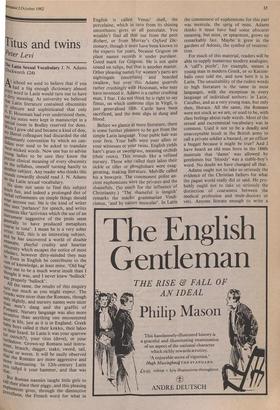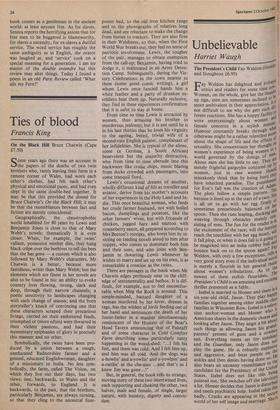Titus and twins
Peter Levi
e Latin Sexual Vocabulary J. N. Adams Duckworth £24) e Latin Sexual Vocabulary J. N. Adams Duckworth £24) Aschool we used to believe that if you had a big enough dictionary almost ,everY word in Latin would turn out to have " dirrY meaning. At university we believed that Latin literature contained obscenities s° obscure and sophisticated that only A' E. Housman had ever understood them, 411d his notes were kept in manuscript in a reial room in Bodley reserved for dons. hen I grew old and became a kind of don, 'Y liberal colleagues had discarded the old gentlemanly convention by which no can- didate ever used to be asked to translate these wicked words. Now one has to advise Y°4 r18 ladies to be sure they know the Precise clinical meaning of every obscenity °n the syllabus, oneself turning hastily to Mother subject. Any reader who thinks this sounds cowardly should read J. N. Adams
the Latin sexual vocabulary.
He does not seem to find this subject much fun, and indeed a prolonged diet of erbal refinements on simple things should wear anyone out. He is the kind of writer who uses 'parlance' for speech, and writes shtences like 'activities which the use of an instrument suggestive of the penis seem generallY to have produced metaphors coarse in tone'. I mean he is a very sober writer. Still, this is an interesting subject, and he has uncovered a world of double entendre, playful crudity and heartier ?hseertity which escapes the notice of most 'bellolars, however dirty-minded they may se' Even in English he contributes to the fain of knowledge, at least mine. 'Old bag' th' arils Oughtwas it was, and I never knew 'bollock'
as Properly 'ballock'.
t All the same, the results of this enquiry i.,1411 out much as you might expect. The "'reeks were nicer than the Romans, though fut.:11Y slightly, and nursery names were nicer Pan men's slang and the graffiti of i,s("Peil. Nursery language was also more ,"ventive than anything one encountered ibater in life, just as it is in England. Greek oabY boys called it their kokko, their laloo r their lizard. In Latin it was your sparrow (tor ostrich?), your titus (dove), or your ,,,Urttedove. 'Grown-up Romans said instru- ',`_ent, branch, dagger, stake, sword, tail, `.firnat or worm. It will be easily observed that the Romans are more aggressive and 5,1110°re insinuating. In 12th-century Latin 11
that. Called it your hammer, and that was Rut Roman nannies taught little girls to ;all thheir place their piggy, and this pleasing ,,413eMism gives, through the diminutive "clreellana the French word for what in English is called Venus' shell, the porcelaine, which in turn from its shining smoothness gives us all porcelain. You wouldn't find all that out from the petit Robert, or from Murray's Oxford Dic- tionary, though it must have been known to the experts for years, because Grigson on plant names records it under purslane. Good mark for Grigson. He is not quite sound on tulips, but that is another matter. Other pleasing names for women's parts are nightingale (uncertain) and bearded swallow, but over this Adams quarrels rather crushingly with Housman, who may have invented it. Adams is a rather crushing man, I fear. I do not think he is right to say fimus, on which someone slips in Virgil, is just generalised filth. Cattle have been sacrificed, and the man slips in dung and blood.
Before we glance at more literature, there is some further pleasure to be got from the simple Latin language. Your pubic hair was your fern. Your balls were your allies or your witnesses or your twins. English yields hare's grass or sweetgrass, meaning orchids (their roots). This sounds like a refined nursery. Those who called their laloo their sickle or tiller or ploughshare were exag- gerating, making literature. Melville called his a bowsprit. The commonest polite an- cient euphemisms were the privates and the shamefuls. (So much for the influence of Christianity.) 'The shameful is longish' remarks the macho grammarian Vindi- cianus, 'and by nature muscular'. In Latin the commonest of euphemisms for this part was mentula, the sprig of mint. Adams thinks it must have had some obscurer meaning, but mint, or spearmint, grows up remarkably fast. Maybe it grew in the gardens of Adonis, the symbol of resurrec- tion.
For much of this material, readers will be able to supply numerous modern analogies. A 'calf's pizzle', for example, means a young man in modern Greek, or so Katsim- balis once told me, and now here it is in Latin. The unsuitability of the rudest words to high literature is the same in most languages, with the exception in every language of individual authors: in Latin, Catullus, and as a very young man, but only then, Horace. All the same, the Romans were not stuck as we are, or used to be, with class feelings about rude words. Most of the sexual and excremental vocabulary was in common. Used it not to be a deadly and unacceptable insult in the British army to call a private soldier a bastard, or an officer a bugger because it might be true? And I have heard an old man born in the 1860s maintain that 'damn' was allowed by gentlemen but 'bloody' was a stable-boy's word. No doubt we have changed all that.
Adams ought not to take so seriously the evidence of the Christian fathers for what the pagan world really did or said. He pro- bably ought not to take so seriously the distinction of coarseness between the medical profession and mule-doctors or vets. Anyone literate enough to write a
book counts as a gentleman in the ancient world: at least anyone free. As for slaves, Seneca reports the horrifying axiom that for free men to be buggered is blameworthy, for slaves a necessity, for ex-slaves a dutiful service. The word service has roughly the same ambiguity as in English, the orator was laughed at, and 'service' took on a special meaning for a generation. I am no master of the double entendre but this review may alter things. Today I found a poem in an old Paris Review called 'What ails my Fern?'







































 Previous page
Previous page